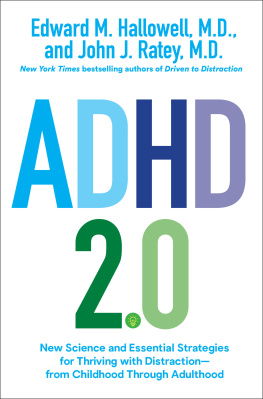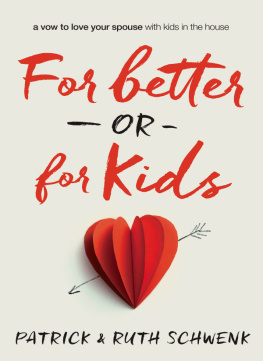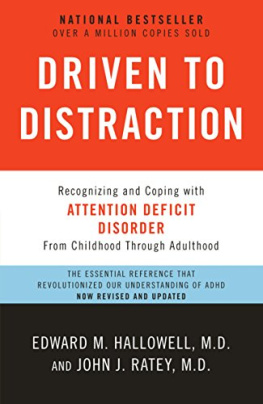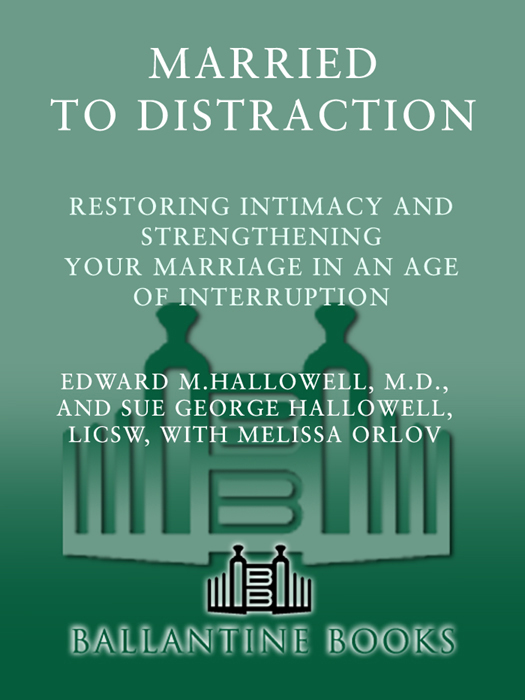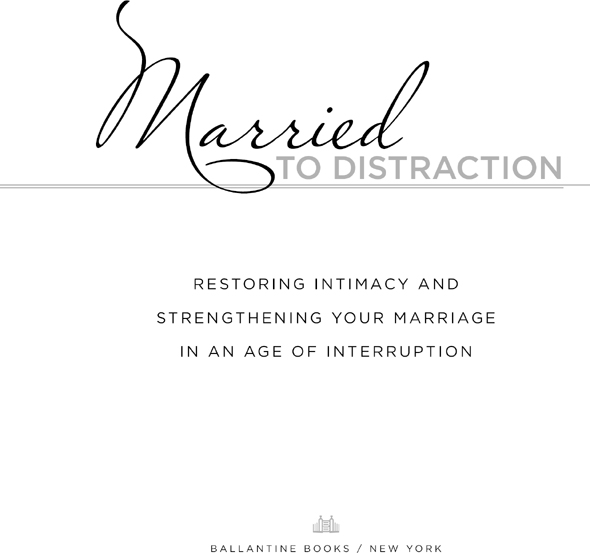23. Ten Reasons Not to Get Divorced;
Ten Reasons To Get Divorced; and
Forty Ways to Make Your Marriage Great
Introduction
H ave you found that it is increasingly difficult to get your partners attention, not to mention affection? Are too many of your conversations devoted to bad news and toxic worries? Are you feeling a little lonely, even though you do (usually) love the person youre with? Do you feel as if many important conversations take place on the go, or via cell phone with its incessant, infuriating dropping of the calls? Do interruptions often abort your attempts to sustain a conversation? Do you frequently cram an hours worth of dialogue into two minutes of blurting as youre rushing out the door? Do you feel a rising anger at your spouse without knowing why? Are you frazzled, even worn-out, when youre only halfway through your day? Do you feel as if communicating with your partner is like trying to talk to someone who is sitting five rows in front of you at a sold-out rock concert where you have to scream just to get the simplest phrase heard?
If you answer yes to some or all of these questions, youre not alone. Welcome to modern life, with its ever-expanding array of ways to stay in touch using technology and with its ever-expanding array of worries that come from knowing so much about so many terrible things that happen in the world and that could in theory threaten you. Dont misunderstand us. We are not Luddites, lamenting the state of our new technologically oriented world. Being able to be in touch with world news and communicate quickly when you want to presents an abundance of opportunities and excitement. This brave new world is spectacular in many beneficial ways.
But it can make your love life difficult, and it can sabotage good relationships without your knowing whats going on, unless youre wise to the unique traps modern life can set. Ironically, if youre not careful, your ability to communicate in so many ways can actually confuse and corrupt what you need to communicate and thereby damage relationships even between people who like or love each other.
You may sense that people around you are grumpier than they used to be, but you dont know why. One reason is that many people are inordinately distracted, overloaded, and worried. Its impossible to be intimate and sustain a loving relationship when youre in that frame of mind. This book will point out how to avoid the traps that can sabotage love, and it will steer you toward a stronger relationship with your spouse or partner.
We live in a world thats radically changed from just a generation ago. Life now poses new, unique problems, never before encountered in human history. Well leave the discussion of most of those problems to the economists, sociologists, scientists, statespeople, and computer experts, who understand them better than we do.
What we know most about is love. So we look at the problem of intimacy in todays world. What weEdward (called Ned), a psychiatrist, and Sue, a social workerare best qualified to examine are the ways in which our new world makes love difficult, and what you can do to make your love as good as you want it to be.
What distinguishes this book from other books on relationships is our emphasis on whats new and difficult now and on how patterns of intimacy are currently changing. Due to the tectonic shift weve seen in everyday life over the past decade or so, the patterns of how people get close and stay close are shifting, right along with the economy, the political balance of power, the climate, and the speed of communication.
While intimacy has never been easy, todays world poses novel challenges. So much is new: from texting your lover to finding lovers online to competing with an electronic device for your lovers attention to feeling in your marriage the new economic pressures of recession, downsizing, and globalization, to living with faster change and greater uncertainty than the world has seen since the Big Bang.
At the heart of the current context is what we call the modern paradox: never before has it been so easy to stay in touch with so many people electronically, but rarely has it seemed so difficult to maintain genuine human closeness. Our electronic world has simultaneously allowed us and forced upon us a kind of emotional insulation and isolation from one another. What started as convenience has turned into a kind of extraverted loneliness: our world produces a massive, daily exchange of dialogue and data while the people participating in it feel curiously alone.
In addition, the combination of global politics, environmental pollution, and precipitous economic decline has ratcheted stress and anxiety into the danger zone. Its dangerous to live with as much fear and stress as we do these daysone more fact to worry about! We find fear and stress everywhere we look, in ourselves, in our friends, in our colleagues, even in our children. Stress poisons intimacy in relationships by distracting us from the people we care the most about.
We have all had a hand in the creation of our new world, if only by our being swept up in it and hurried along. Think of how the daily details of our lives have changed in the past ten or fifteen years. When did you first own a cell phone? When did you first get over one hundred channels on your TV? How long ago could you not go to stores on Sunday because they were closed? When did you stop handwriting letters? When did you first use Google? When did you first start to feel overbooked and about to snap?
Then, just when you thought you couldnt get any busier or handle any more stress, the economy tanked. Suddenly, invisible people youd never seen and never known stole the front pages, and you learned they were stealing from you. You read about lost sums of money too vast to comprehend. But you could comprehend only too well that your trust had been violated, your savings depleted if not wiped out, and your job put in jeopardy. With that, you felt a new surge of fear and angerand another worry!
Love and support from your spouse or mate now looked more crucial than ever. Where else could you turn? But you hadnt noticed that this crazy busy world had made finding that love and support more difficult than ever. Everyones so preoccupied and distracted. Who can pay attention long enough to love?
THE MARRIAGE BEHIND THIS BOOK
This book is a collaborative work. Just as the primary solution we offer is the power of the human connection, so the book itself grew out of human connection. For the moment, though, let meNedswitch to the first person to tell you a bit about Sue and me.



